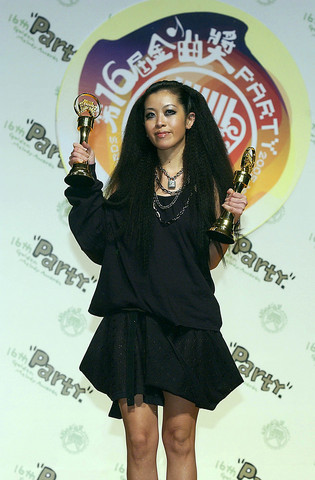By the time the Golden Melody Awards had finished late Saturday night, the event that had developed a reputation in recent years for monotony and predictability ended up stunning audiences by handing the three top awards to some of the darkest horses on the nominee list.
Perhaps the greatest shock of them all was the Best Album award going to Sandee Chen (
Also surprising was the conspicuous absence of Jay Chou taking the stage on the receiving end of an award. He won the top album awards in 2002 and last year and this year released the best-selling album in Mando-pop titled Common Jasmine Orange (

PHOTO: TAIPEI TIMES
Before Saturday, the safe money would have been on Chou taking at least two awards, but this year's Golden Melody was different in more ways than just this one.
Beating the heavyweights Chou and Wang Lee-hom in the Best Mandarin Male Singer category was Stanley Huang (
The crowded list in the Best Mandarin Female Singer category included Chang Hui-mei (
Chang Hui-mei, also known as A-Mei, was sent packing once again without a trophy as she has every year since she's been nominated.
The biggest winners of the night ended up being Sheng Xiang and Water 3 (
One of the most memorable moments of the night was the announcement for the Best Male Mandarin Singer award, which was read by Karen Mok. Speaking in Mandarin with her Hong Kong accent, Mok's pronunciation of the first two characters of Stanley Huang's name sounded indistinguishable from the first two characters of Wang Lee-hom's name, creating a painfully awkward scene in which both singers stood and began congratulating each other and thanking everyone around them. Wang even leaned in close to the TV camera winking and saluting and then rushed onto the stage, where he was told that it was, in fact, Stanley, walking a few steps behind him, who was the actual recipient. Visibly embarrassed, he skipped off stage, but received a conciliation hug from super-model Lin Chih-ling (
From the perspective of the press pit, the ceremony in years past had taken on the qualities of a comedy, as bloopers like the one Mok provided Saturday night abounded. But this year's ceremony was also remarkable for its mercifully short and entertaining performances -- a major break from the past. The addition of Patty Hou (

In the March 9 edition of the Taipei Times a piece by Ninon Godefroy ran with the headine “The quiet, gentle rhythm of Taiwan.” It started with the line “Taiwan is a small, humble place. There is no Eiffel Tower, no pyramids — no singular attraction that draws the world’s attention.” I laughed out loud at that. This was out of no disrespect for the author or the piece, which made some interesting analogies and good points about how both Din Tai Fung’s and Taiwan Semiconductor Manufacturing Co’s (TSMC, 台積電) meticulous attention to detail and quality are not quite up to

April 21 to April 27 Hsieh Er’s (謝娥) political fortunes were rising fast after she got out of jail and joined the Chinese Nationalist Party (KMT) in December 1945. Not only did she hold key positions in various committees, she was elected the only woman on the Taipei City Council and headed to Nanjing in 1946 as the sole Taiwanese female representative to the National Constituent Assembly. With the support of first lady Soong May-ling (宋美齡), she started the Taipei Women’s Association and Taiwan Provincial Women’s Association, where she

It is one of the more remarkable facts of Taiwan history that it was never occupied or claimed by any of the numerous kingdoms of southern China — Han or otherwise — that lay just across the water from it. None of their brilliant ministers ever discovered that Taiwan was a “core interest” of the state whose annexation was “inevitable.” As Paul Kua notes in an excellent monograph laying out how the Portuguese gave Taiwan the name “Formosa,” the first Europeans to express an interest in occupying Taiwan were the Spanish. Tonio Andrade in his seminal work, How Taiwan Became Chinese,

Mongolian influencer Anudari Daarya looks effortlessly glamorous and carefree in her social media posts — but the classically trained pianist’s road to acceptance as a transgender artist has been anything but easy. She is one of a growing number of Mongolian LGBTQ youth challenging stereotypes and fighting for acceptance through media representation in the socially conservative country. LGBTQ Mongolians often hide their identities from their employers and colleagues for fear of discrimination, with a survey by the non-profit LGBT Centre Mongolia showing that only 20 percent of people felt comfortable coming out at work. Daarya, 25, said she has faced discrimination since she